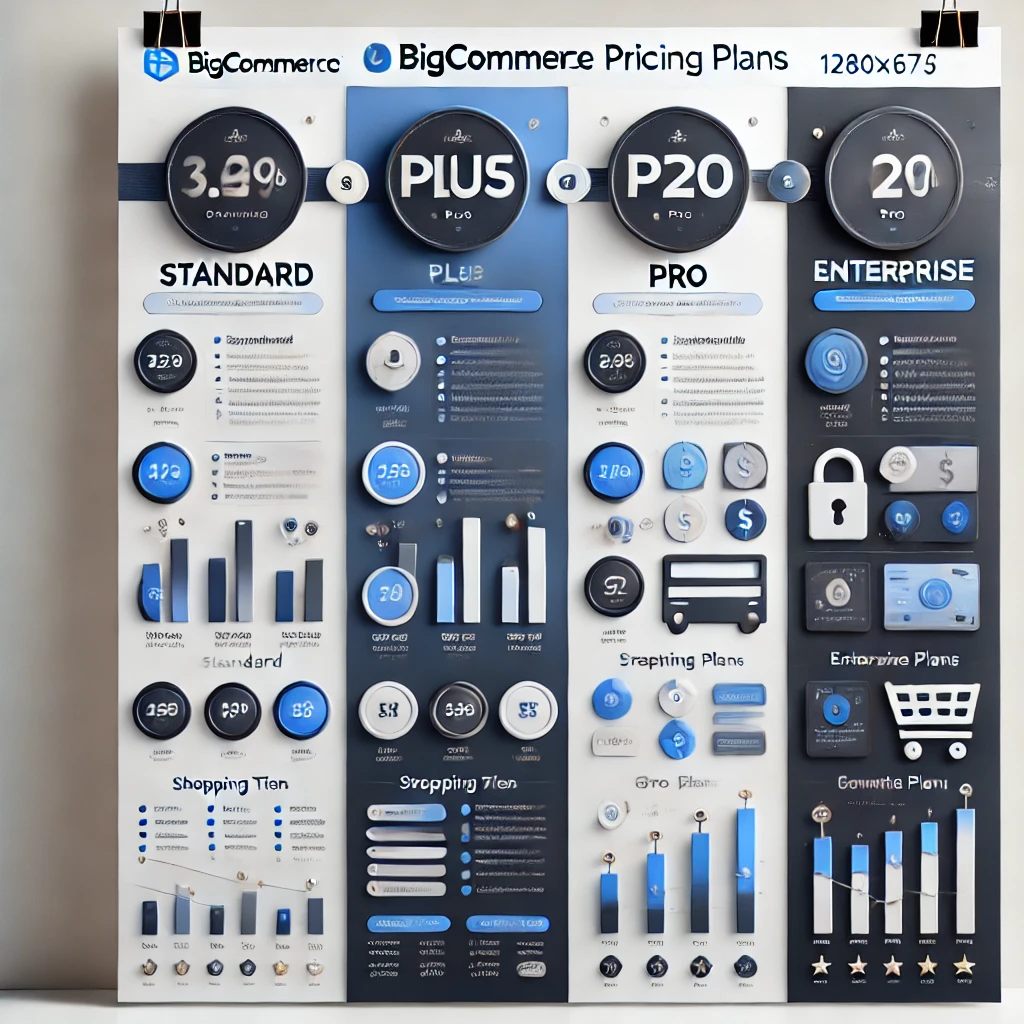BigCommerce Pricing: A Comprehensive Guide to Understanding Costs, Plans, and Value

Choosing the right platform is crucial for your bigcommerce pricing success in eCommerce. BigCommerce is one of the leading eCommerce solutions, offering a range of pricing plans designed to cater to companies of various sizes and needs. However, understanding the pricing structure and the value each Plan provides is essential for bigcommerce pricing an informed decision. In this article, we’ll explore BigCommerce’s pricing plans, additional costs, and comparisons with competitors and help you determine if BigCommerce is the right choice for your business.
BigCommerce Pricing Plans Explained
1.1. Standard Plan
The Standard plan is bigcommerce pricing entry-level offering, making it an ideal choice for small businesses starting in eCommerce. At a monthly cost of around $29.95, this Plan offers a robust set of features, including unlimited products, file storage, and bandwidth. Additionally, the Standard plan includes a free SSL certificate, which enhances security for your customers during transactions.
This Plan suits businesses with modest sales expectations and doesn’t yet require advanced tools. Key features include basic reporting, single-page checkout, and BigCommerce’s app marketplace access. While this Plan provides a great start, some features like professional reporting and abandoned cart saver are reserved for higher-tier plans. If your business is growing or expects higher sales volumes, you might need to upgrade to unlock more advanced features.
For small businesses with fewer than 50,000 annual online sales, the Standard plan offers an excellent balance of affordability and functionality. Still, scaling may prompt the need for a higher-tier plan as your business expands.
1.2. Plus Plan
BigCommerce’s Plus plan is designed for growing businesses that require more advanced features and functionality. Priced at $79.95 per month, the Plus plan includes everything in the Standard plan, plus additional features like abandoned cart recovery, customer groups, and more advanced reporting tools. It allows businesses to streamline customer interactions and enhance the shopping experience with features like real-time shipping rates and custom SSL certificates.
The Plus plan is ideal for businesses with a growing customer base or those looking to scale operations. With support for up to $180,000 in annual online sales, companies can benefit from advanced marketing tools and integration with major payment gateways like PayPal and Stripe. Additionally, the Plan allows enterprises to integrate with more third-party apps, which can help customize the store experience.
While more expensive than the Standard Plan, the Plus plan delivers enhanced functionality that can help increase conversion rates and improve customer retention, making it an excellent option for businesses looking to expand.
1.3. Pro Plan
For businesses experiencing rapid growth, the Pro plan offers a more comprehensive solution. Priced at $299.95 per month, the Pro plan provides all the features of the Standard and plans, with additional capabilities aimed at businesses with more extensive operations. This includes advanced reporting tools, professional customer segmentation, and a variety of marketing integrations.
The Pro plan also supports businesses generating up to $400,000 in annual sales. With more powerful features like custom SSL certificates, advanced fraud detection, and higher-tier security, it is perfect for companies with a more extensive customer base or those looking to move to a more enterprise-level solution. The Pro plan also includes access to BigCommerce’s API, which allows for greater customization and integration with various business tools.
While the Pro plan is a significant investment, it offers scalability, advanced features, and performance that can help businesses boost their sales and operational efficiency.
1.4. Enterprise Plan
BigCommerce’s Enterprise plan is tailored for large businesses or organizations with complex eCommerce needs. Pricing for this Plan is custom and depends on factors such as sales volume, desired features, and additional customizations. This Plan includes all the features of the Standard, Plus, and Pro plans, with added enterprise-level functionalities.
Key benefits of the Enterprise plan include advanced customization options, dedicated support, and the ability to handle high-volume sales. This Plan also offers personalized onboarding, custom APIs, and enhanced security measures. Large businesses that require more control over their online store and access to BigCommerce’s advanced reporting and analytics tools will find the Enterprise plan a worthwhile investment.
For large-scale businesses with high sales and customer service demands, the Enterprise plan ensures that BigCommerce meets all expectations and provides the necessary tools for expansion.
Additional Costs and Fees to Consider
2.1. Transaction Fees
One crucial aspect to consider when evaluating BigCommerce pricing is the transaction fees associated with using third-party payment gateways. BigCommerce does not charge transaction fees when you use its native payment gateway, BigCommerce Payments. However, if you use a third-party gateway like PayPal or Stripe, BigCommerce charges a small fee for each transaction, depending on your selected Plan.
The Standard and Plans charge a 2.9% + 30¢ fee per transaction, while the Pro plan reduces this fee to 2.2% + 30¢. This can add up over time, especially for high-volume stores, so factoring these fees into your overall pricing structure is essential.
Choosing BigCommerce Payments can help you save on transaction fees, but evaluating the trade-offs regarding payment processor integration and customer preferences is essential. Always weigh the benefits of using BigCommerce Payments versus third-party gateways based on your business needs.
2.2. Payment Gateway Costs
While BigCommerce does not charge for using its native payment processor, there are still fees associated with using external gateways. Providers like PayPal, Stripe, and Authorize.net have their fees, including fixed transaction fees, processing fees, and currency conversion fees. These additional costs should be carefully considered when budgeting for your online store.
BigCommerce integrates with several popular gateways, making it easy to connect your store to the system that works best for your business. However, it’s essential to consider these additional charges when comparing the total cost of ownership for using third-party payment processors versus BigCommerce’s payment solutions.
2.3. App and Add-on Costs
One of the greatest strengths of BigCommerce is its extensive marketplace of apps and add-ons, which can significantly enhance your store’s functionality. However, many of these apps come with additional monthly costs. Whether it’s an advanced email marketing tool, a product recommendation engine, or an analytics dashboard, the price of these apps can quickly add up.
While many apps offer free trials or basic free plans, unlocking their full capabilities often requires a paid plan. Depending on the tools you need, app costs can increase your overall expenditure, so it’s essential to budget for these additional expenses when planning your eCommerce store.
How BigCommerce Pricing Stacks Up Against Competitors
3.1. BigCommerce vs Shopify

BigCommerce and Shopify are two of the most popular eCommerce platforms offering similar pricing structures. However, BigCommerce tends to be more affordable at higher levels, especially for larger businesses. Shopify’s pricing starts at $29 per month for its Basic Plan, similar to BigCommerce’s Standard plan, but Shopify’s transaction fees can be higher depending on the payment gateway used.
BigCommerce provides more features for a similar price, especially in terms of reporting and analytics tools, and its lower transaction fees make it a more attractive option for businesses with higher sales volumes. On the other hand, Shopify offers a broader range of themes and third-party apps, making it more customizable for companies that need more design options.
3.2. BigCommerce vs WooCommerce
WooCommerce is a popular open-source eCommerce plugin for WordPress that operates on a different pricing model. While WooCommerce is free to install, businesses must pay for web hosting, security, and additional tools. When you factor in hosting fees, SSL certificates, and third-party plugins, WooCommerce can become more expensive than BigCommerce for similar functionalities.
The advantage of WooCommerce is its flexibility, but it requires more technical know-how and a more significant time investment to manage. BigCommerce, on the other hand, offers a fully hosted solution, meaning that hosting, security, and maintenance are included in the price.
Is BigCommerce Worth the Price?
4.1. Value for Small Businesses
BigCommerce offers excellent value for small businesses that need a reliable, secure, and feature-rich platform without breaking the bank. The Standard plan provides a great starting point; you can quickly scale up to higher-tier plans as your business grows.
The lack of transaction fees with BigCommerce Payments makes it a cost-effective option for small businesses that want to avoid additional costs, and the platform’s built-in tools for SEO, marketing, and reporting can help companies increase sales and visibility without needing to invest heavily in third-party services.
4.2. Value for Growing Businesses
For businesses looking to scale, BigCommerce’s Plus and Pro plans offer advanced tools to help streamline operations, enhance marketing efforts, and improve customer retention. With features like abandoned cart recovery, custom reporting, and advanced integrations, these plans provide excellent value for growing businesses that want to optimize their e-commerce operations.
The scalability of BigCommerce’s plans ensures that you can continue to benefit from the platform’s features as your business grows without switching to a different service.
4.3. Value for Large Enterprises
BigCommerce’s Enterprise plan is tailored for large businesses with high sales volumes and complex needs. While the pricing can be higher, the additional features, customization options, and dedicated support make it a worthy investment for enterprises that require advanced functionality.
With custom APIs, personalized onboarding, and high-level security, BigCommerce’s Enterprise plan ensures that large businesses can continue to scale without compromising quality or service.
Conclusion
BigCommerce’s pricing structure is designed to cater to businesses of all sizes, from small startups to large enterprises. With various plans offering different features, choosing the right one is essential based on your business’s current needs and goals. While the platform’s pricing may seem higher compared to some competitors, its value in terms of features, security, and scalability makes it a solid choice for businesses looking to grow in the e-commerce space.
You May Also Read: https://ventsbuz.com/affiliate-marketing-jobs/





